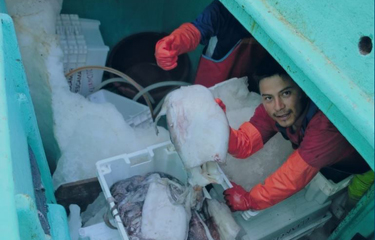Latin American fishing group criticizes China’s squid-jigging moratorium as meaningless

A moratorium announced by China on fishing by its squid fleet in the Southwest Atlantic is an empty gesture timed to coincide with the habitual end of the squid season when stocks have already been fished, according to a Latin American campaign group seeking stricter regulation of distant-water fishing in the region.
China's Agriculture Ministry recently announced the moratorium, which will be enforced from 1 July through 30 September. It is the second year in a row China has placed a ban on its distant-water fleet operating in the Southwest Atlantic during this timeframe. This year, China has added a similar moratorium on its vessels fishing in the East Pacific and has presented the measure as a gesture of responsibility toward the conservation of fish stocks.
However, the ban is timed to coincide with the exhaustion of seasonal stocks and will not have a positive impact on conservation, according to Organization for the Protection of Resources in the Southwest Atlantic (OPRAS) Director Eduardo Pucci.
Pucci told SeafoodSource that China’s moratorium is “due to the end of the period to illex capture in the Southwest Atlantic Ocean and not a measure aimed at the conservation of the species.”
“In fact, when the harvest ends in the Atlantic, they only change their destination for a few months and they concentrate on the southern coast of the Pacific, with similar consequences for Peru and Ecuador,” he said.
OPRAS wants tighter regulation of migratory squid stocks and cooperates with the Committee for the Sustainable Management of the Jumbo Flying Squid in the South Pacific (CALAMASUR), which includes industry stakeholders from Chile, Ecuador, Mexico and Peru
China raises this moratorium as “a significant contribution to the conservation and sustainable exploitation of the Argentine squid, but in fact the measure has no impact on the resource because it is no longer in the area,” Pucci said.
“Ergo, there is nothing to protect,” he said.
Asian trawlers – mostly from China, South Korea, and Taiwan – typically arrive in the Southwest Atlantic in early November to kick off the season the following year. The vessels "remain in the area until the Argentine squid yields are zero, a date that varies depending on the annual abundance of the resource," according to Pucci.
Pucci said the zero-yield date has rarely extended to July, when China’s moratorium is set to begin. Pucci said data showing the start- and end-dates of the presence of squid-jiggers outside Argentinean waters over the last six years, provided by the Instituto Nacional de Investigación y Desarrollo Pesquero (INIDEP), an Argentine government agency, shows that “within the period of the Chinese moratorium, the foreign jigging fleet is normally not in the region because the fishing season ends earlier."
“For the same reason, there were never Chinese jiggers in the region between July and October,” he said. “This is an attempt to install a positive international image on the activity of the Chinese fleet.”
In 2021, the foreign squid-jigger catch outside the 200-mile exclusive economic zone off the coast of South America amounted to 270,000 metric tons (MT) of illex. The British Malvinas fleet took 170,000 MT, while the Argentina fleet accounted for 130,000 MT.
Pucci said the influx of Asian trawlers in recent years has “serious consequences” for local coastal states, and added that a “heavily subsidized” foreign fleet “every year repeats its irregular exploitation and behavior outside the EEZ, avoiding basic rules and international legislation to improve the cooperation for conservation in the high seas.”
“[This affects] the local industry and the transparency of international trade, with an offer of products obtained with very low working conditions and dumping prices,” he said.
Pucci called for China to take more serious measures to reduce its catch to sustainable levels.
“Illex squid biomass is variable and cyclical and its abundance depends on various factors, but surely not on the prudence or responsibility of the Chinese fleet on the high seas,” he said. “IUU fishing is a constant in this area, where we can find abuse of the limits of coastal jurisdiction and the lack of binding regulations in international waters.”
Photo courtesy of CALAMASUR






Share